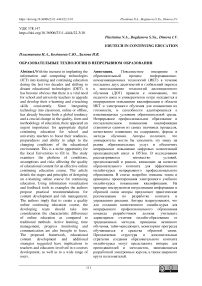Edutech in continuing education
Автор: PlastiNina Nina A., Bogdanova Svetlana Yu., Dimova Irina V.
Журнал: Вестник Нижневартовского государственного университета @vestnik-nvsu
Рубрика: Педагогические науки
Статья в выпуске: 3, 2022 года.
Бесплатный доступ
With the increase in implanting the information and computing technologies (ICT) into learning and continuing education during the last two decades and shifting to distant educational technologies (DET), it has become obvious that there is a vital need for school and university teachers to upgrade and develop their e-learning and e-teaching skills consistently. Since integrating technology into classroom, online or offline, has already become both a global tendency and a crucial change in the quality, form and methodology of education, there appeared an urgent importance for appropriate digital continuing education for school and university teachers to boost their readiness, preparedness and ability to adapt to the changing conditions of the educational environment. This is a niche opportunity for the local Universities to fill in. The study examines the plethora of conditions, assumptions and risks affecting the quality of educational content for an effective online continuing education course. The article details the stages and principles of designing an e-learning online course for continuing education. Using information visualization and feedback tools as examples the authors propose practical recommendations for content development and risk management. The authors imply that to create a quality online continuing education course, the developing team should take into consideration the characteristic differences of online education as compared to traditional methods. Active learning, time management, progress monitoring and communication are also brought to focus. The proposed framework, educational content development and additional strategies suggested have implications to teachers and educators involved in e-courses development, as well as to a wide range of users.
Edutech, continuing education, distance learning, e-learning, information and computing technologies, mobile learning
Короткий адрес: https://sciup.org/14125279
IDR: 14125279 | УДК: 378.147 | DOI: 10.36906/2311-4444/22-3/10
Список литературы Edutech in continuing education
- Gurevich, L.S. (2020). Fors-mazhornyi distant v usloviyakh neshtatnoi situatsii: chastnye uroki COVID-19. In Lingvistika i lingvodidaktika v svete sovremennykh nauchnykh paradigm, 3, Irkutskt, 255262. (in Russ.).
- Davydov, S.G., Ishun'kina, I.V., Levova, I.Yu., Logunova, O.S., Kazaryan, K.R., Plugotarenko, S.A., & Saikina, M.V. (2019). Internet v Rossii. Moscow. (in Russ.).
- Zhidkova, I.E. (2016). Nepreryvnoe obrazovanie uchitelei: rossiiskaya i evropeiskaya modeli. Nauchnoe obespechenie sistemypovysheniya kvalifikatsii kadrov, (1 (26)). (in Russ.).
- Mitin, A.N. (2014). Kompetentnostnyi podkhod v obuchenii informatsionnym tekhnologiyam s ispol'zovaniem elektronnykh obrazovatel'nykh resursov. Baltiiskii gumanitarnyi zhurnal, (4), 93-96. (in Russ).
- Miroshnichenko, A.A. (2012). Pedagogicheskii vuz kak tsentr nepreryvnogo obrazovaniya uchitelei. Obrazovanie cherez vsyu zhizn': nepreryvnoe obrazovanie v interesakh ustoichivogo razvitiya, (2). (in Russ.).
- Plastinina, O.N., & Grigorieva, E.S. (2021). Basic Educational Content Development for Distanse Learning: Theory and Practice. Bulletin of Nizhnevartovsk State University, (1(53)), 48-55. (in Russ.). https://doi.org/10.36906/2311-4444/21-1/07
- Allen, I. E., & Seaman, J. (2016). Online report card: Tracking online education in the United States. Babson Survey Research Group. Babson College, 231 Forest Street, Babson Park, MA 02457.
- Bacsich, P. (2012). Alternative models of education delivery. Moscow: y the UNESCO Institute.
- Campion, M. (1997). The changing nature of academic work: implications for professional continuing education. Studies in continuing education, 19(2), 143-159. https://doi.org/10.1080/0158037970190205
- Dahlstrom, E., Brooks, D. C., & Bichsel, J. (2014). The current ecosystem of learning management systems in higher education: Student, faculty, and IT perspectives.
- Daniel, S. J. (2012). ICTs in Global Learning/Teaching/Training: Policy Brief. M.: UNESCO Institute for Information Technologies in Education.
- Gay, G.H. (2016). An assessment of online instructor e-learning readiness before, during, and after course delivery. Journal of Computing in Higher Education, 28(2), 199-220. https://doi.org/10.1007/s12528-016-9115-z
- Haugsbakken, H. (2020). Five Learning Design Principles to Create Active Learning for Engaging With Research in a MOOC. http://dx.doi.org/10.2478/eurodl-2020-0003
- Horvitz, B. S., Beach, A. L., Anderson, M. L., & Xia, J. (2015). Examination of faculty self-efficacy related to online teaching. Innovative Higher Education, 40(4), 305-316. https://doi.org/10.1007/s10755-014-9316-1
- Kostogriz, A., Adams, M., & Bonar, G. (2022). Affective practice architectures of professional learning in international schools. Studies in Continuing Education, 44(2), 247-265. https://doi.org/10.1080/0158037X.2022.2043267
- MacDonald, K., Diamond, F., Wilkinson, J., Sum, N., Longmuir, F., & Kaukko, M. (2022). Creating spaces of learning in academia: fostering niches for professional learning practice. Studies in Continuing Education, 44(2), 266-283. https://doi.org/10.1080/0158037X.2021.1956890
- Martin, F., Wang, C., Jokiaho, A., May, B., & Grubmeyer, S. (2019). Examining Faculty Readiness to Teach Online: A Comparison of US and German Educators. European Journal of Open, Distance and E-learning, 22(1), 53-69.
- Mason, R. (2006). Learning technologies for adult continuing education. Studies in Continuing Education, 28(2), 121-133. https://doi.org/10.1080/01580370600751039
- Zhou, N., Tigelaar, D. E., & Admiraal, W. (2021). Understanding vocational teachers' professional development in work placement: learning goals, activities, and outcomes. Studies in Continuing Education, 1-19. https://doi.org/10.1080/0158037X.2021.1960496
- Shaw, P., Rawlinson, S., & Sheffield, D. (2020). Exploring the problem of establishing horizon emergent technologies within a higher education institution's operational framework. European Journal of Open, Distance and E-learning, 23(1), 18-31.
- Tallent-Runnels, M. K., Thomas, J. A., Lan, W. Y., Cooper, S., Ahern, T. C., Shaw, S. M., & Liu, X. (2006). Teaching courses online: A review of the research. Review of educational research, 76(1), 93-135. https://doi.org/10.3102/00346543076001093
- Le, V. H., Maor, D., & McConney, A. (2021). The potential of social networking sites for continuing professional learning: investigating the experiences of teachers with limited resources. Studies in Continuing Education, 1-17. https://doi.org/10.1080/0158037X.2021.1932453
- De Wever, B., Hamalainen, R., Nissinen, K., Mannonen, J., & Van Nieuwenhove, L. (2021). Teachers' problem-solving skills in technology-rich environments: a call for workplace learning and opportunities to develop professionally. Studies in Continuing Education, 1-27. https://doi.org/10.1080/0158037X.2021.2003769


